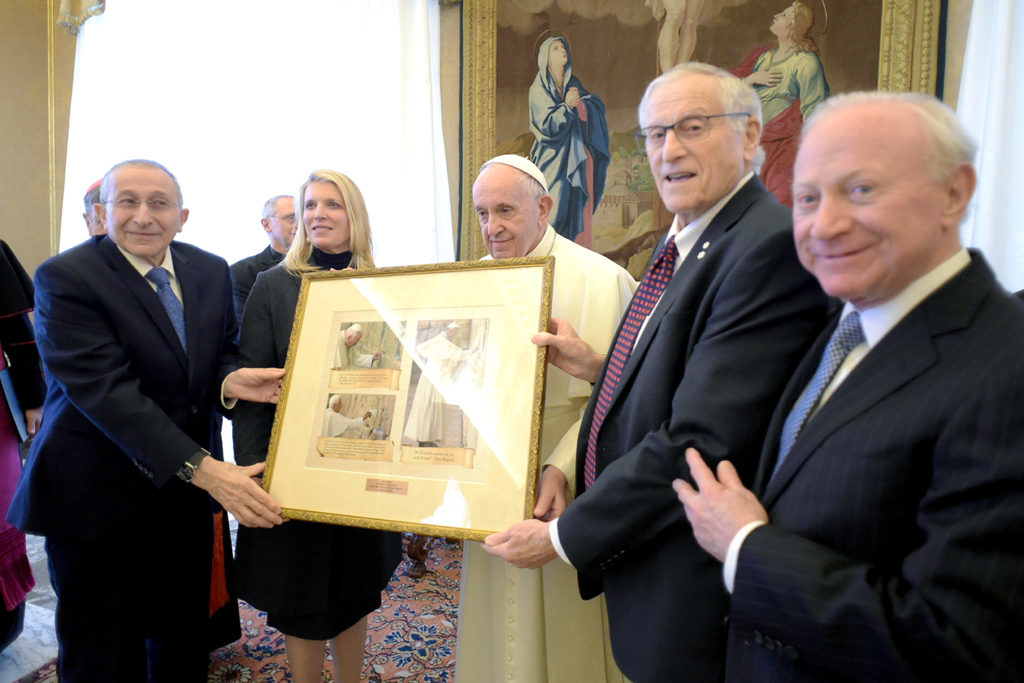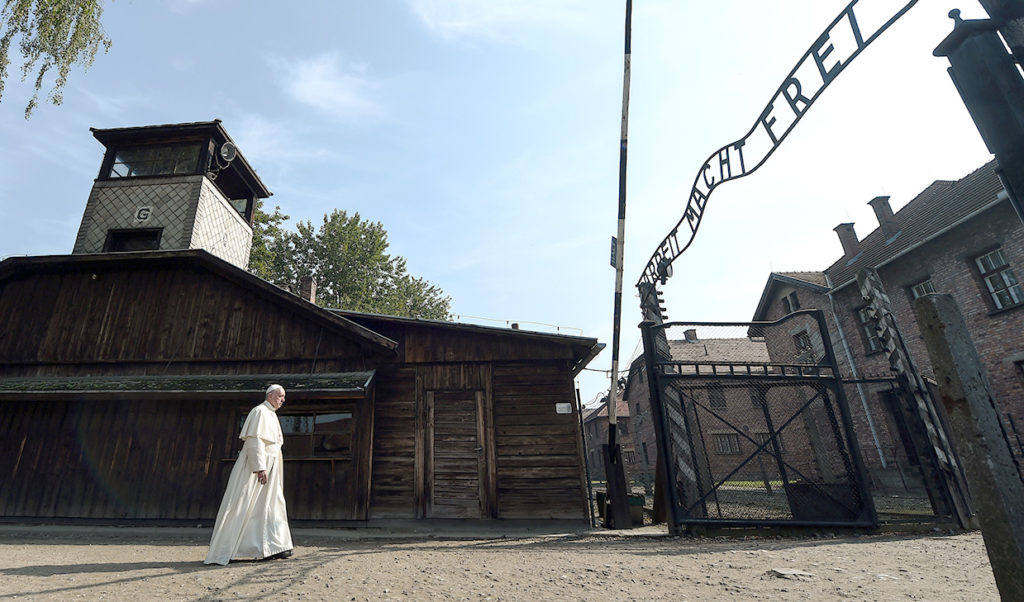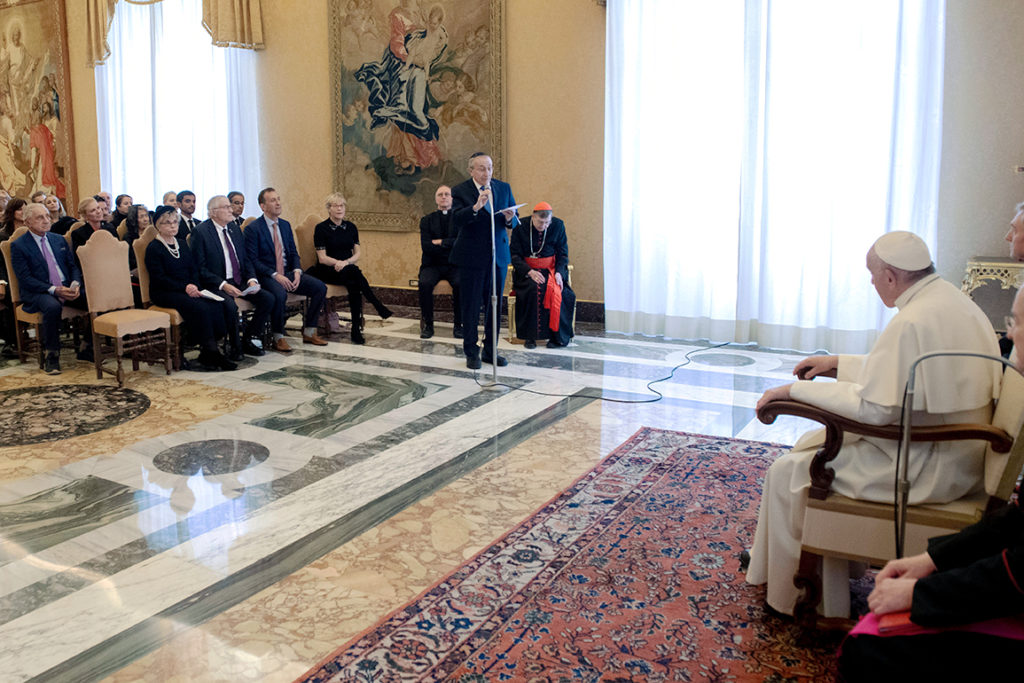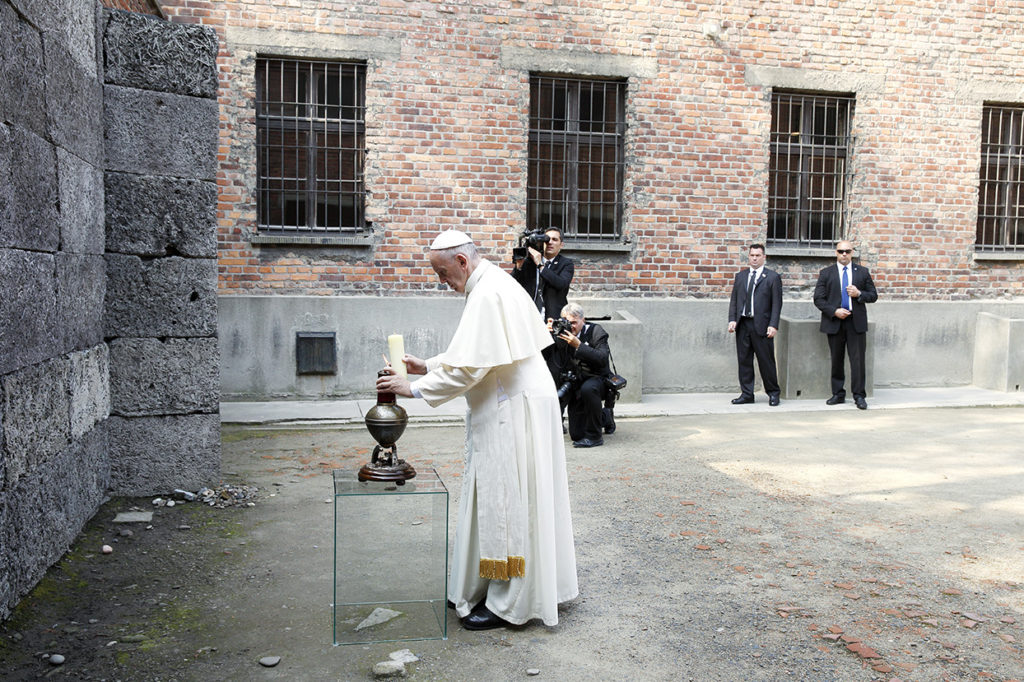VATICAN CITY (CNS) — Pope Francis said remembering the millions of men, women and children who perished in the Holocaust is a call for the world today to reflect and commit to not repeating the atrocities of the past.
Speaking to pilgrims in St. Peter’s Square Jan. 26, the pope said that “in the face of this immense tragedy, this atrocity, indifference is inadmissible, and remembering is a duty.”
“We are all called to have a moment of prayer and reflection, each one saying in his or her own heart, ‘Never again, never again!’” the pope said.
International Holocaust Remembrance Day is observed around the world Jan. 27, which marks the 75th anniversary of the liberation of Auschwitz-Birkenau concentration camp in Oświęcim, Poland.
Operated from 1940 to 1945, Auschwitz was the Nazi’s largest camp and consisted of three parts:
- Auschwitz I, where many were imprisoned and murdered;
- The Birkenau extermination camp — also known as Auschwitz II;
- And Auschwitz III (Auschwitz-Monowitz), an area of auxiliary camps that included several factories.

In 1942, Auschwitz became the site of the mass extermination of over 1 million Jews, 23,000 Roma, 15,000 Soviet prisoners of war and thousands of Polish citizens of different nationalities.
The Nazi’s systematic persecution and genocide led to the deaths of 6 million Jews in Europe.
During his visit to Poland in 2016, the pope visited the Auschwitz death camp, where he prayed in silence and met with survivors of the Holocaust.
The pope has also denounced anti-Semitism and violence against Jewish people, including in November when reports surfaced of an escalation in anti-Semitic violence and vandalism across Europe.
During his weekly general audience Nov. 13, the pope said that the world has “seen so many brutalities done against the Jewish people, and we were convinced that this was over.”
“But today the habit of persecuting Jews is beginning to be reborn,” he said. “Brothers and sisters: this is neither human nor Christian; the Jews are our brothers and sisters and must not be persecuted! Understood?”

Two organizations representing the bishops of Europe also issued a joint statement to mark the anniversary of the liberation of the death camp.
The Council of European Bishops’ Conferences and the Commission of the Bishops’ Conferences of the European Union said “Auschwitz has become a symbol of all German concentration camps, and even of all such extermination sites.”
“Here, the Nazis took the power to decide who is human and who is not. Here, euthanasia met with eugenics,” they said. “Auschwitz-Birkenau is a result of the system based on the ideology of national socialism, which meant trampling the dignity of man who is made in the image of God. Another totalitarianism, namely communism, acted quite similarly, also reaching a death toll of millions.”
The bishops said they wished to “appeal to the modern world for reconciliation and peace, for respect for each nation’s right to exist and to freedom, to independence, to maintain its own culture.”
“We cannot allow the truth to be ignored or manipulated for immediate political needs,” said the Jan. 26 statement. “This appeal is extremely important now, for — despite the dramatic experience of the past — the world in which we live is still exposed to new threats and new manifestations of violence.”

A week earlier on Jan. 20, Pope Francis told a delegation from the Simon Wiesenthal Center, an international Jewish human rights organization based in Los Angeles that combats hate and anti-Semitism around the world, that “I will never tire of firmly condemning every form of anti-Semitism.”
“It is troubling to see, in many parts of the world, an increase in a selfish indifference” that cares only about whatever is easy for oneself and lacks concern for others, the pope said at the Vatican. It is an attitude that believes “life is good as long as it is good for me, and when things go wrong, anger and malice are unleashed. This creates a fertile ground for the forms of factionalism and populism we see around us. Hatred rapidly grows on this ground,” he added.
To tackle the root cause of the problem, he said, “we must commit ourselves also to tilling the soil in which hatred grows and sowing peace instead.”
With integration and seeking to understand others, “we more effectively protect ourselves,” the pope said, therefore, it is “urgent to reintegrate those who are marginalized, to reach out to those far away” and support those who have been “discarded” and to help people who are victims of intolerance and discrimination.

Recalling his own visit in 2016 to Auschwitz-Birkenau, he underlined how important it is to make time for moments of reflection and silence, so as to better hear “the plea of suffering humanity.”
Today’s consumer culture is also gluttonous with words, he said, churning out so many “useless” words, wasting so much time on “arguing, accusing, shouting insults with no concern for what we say.”
“Silence, on the other hand, helps to keep memory alive. If we lose our memory, we destroy our future,” he said.
The commemoration of “the unspeakable cruelty that humanity learned of 75 years ago,” he said, should “serve as a summons to pause,” be silent and remember.
“We need to do this, so we don’t become indifferent,” he said.
And he asked that Christians and Jews continue to use their shared spiritual patrimony to serve all people and to create ways of drawing closer together.
“If we do not do this — we who believe in Him who from on high remembered us and showed compassion for our weaknesses — then who will?”
Contributing to this article were Junno Arocho Esteves and Carol Glatz from Catholic News Service.







